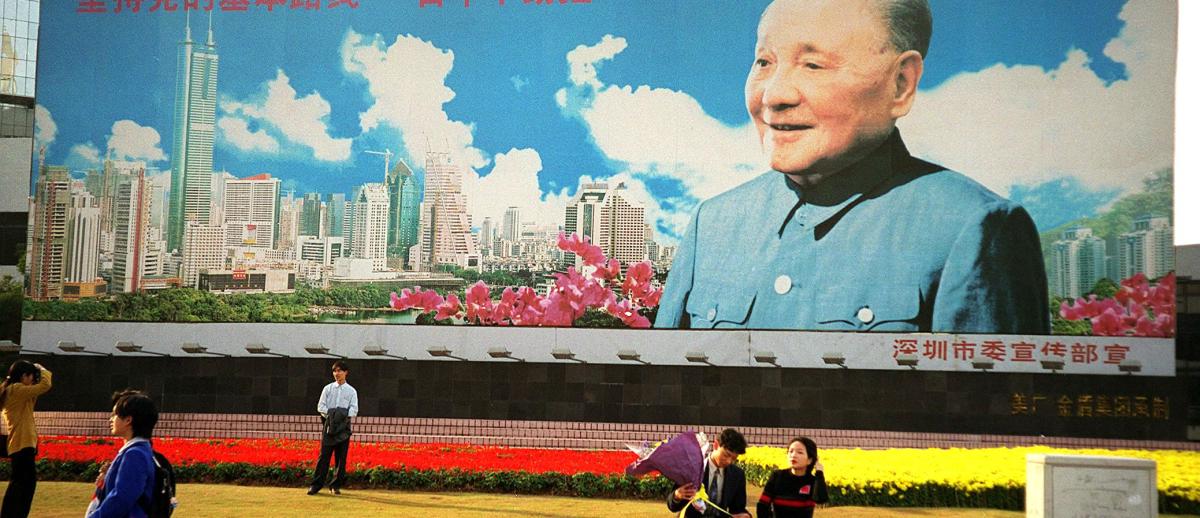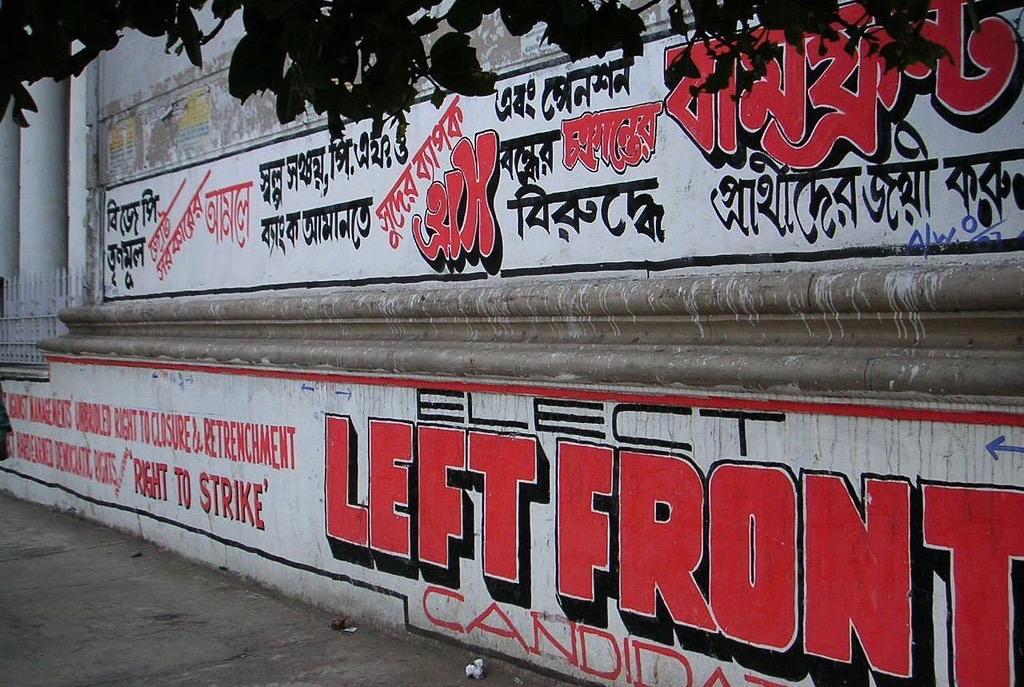The World Historical Implications of the Great Russian Revolution
archive


Deng Xiaoping billboard in Shenzhen, China's first completely planned city. Photo: Peter Lim, AFP | Getty Images
The World Historical Implications of the Great Russian Revolution
When reflecting on the centenary of the 1917 Russian Revolution, it is important to situate it in its wider global context and to try to understand its place in the world historical process. Commonly encountered unilateral assessments of the revolution do not contribute to a sober and adequate understanding of the revolution itself or the sweep of subsequent developments, which were far-reaching and profound, affecting societies around the world and transforming social relations both nationally and internationally. For these and other reasons it is both expedient and logical to regard the February and October Russian revolutions, with all their differences and for all their contrasts, as a single historical process, as different stages of the same revolution. In this respect, we can say that there was a Great Russian Revolution of 1917.
It is obvious that the Russian revolution of 1917-1922, like the Great French Revolution of 1789-1794 in its time, had a huge impact on all subsequent world development. Attempts to ignore this influence or interpret it from the point of view of a narrow ideology lead to a distortion not only of the past, but also of the present and the future. The Russian Revolution became an inevitable consequence not only of the internal contradictions of backward capitalism, but also of the First World War, which shook the previous world order to the core. It follows that all attempts to view the revolution and the entire Soviet period as a "deviation" from the main line of Russian and global history are scientifically untenable.
Against the backdrop of politicians of the time and especially those of today, Lenin looks like a giant. This is no coincidence. The Great Revolution gave rise to great politicians in the person of Lenin and his comrades-in-arms, who understood the situation and felt the moods of the majority, and were able to combine theory and practice, ideas and the organization of huge masses of people. These politicians not only put forward an anti-capitalist modernization project, but also managed to implement it—changing the world in many ways and opening up new options and opportunities for its future development.
Philosophical and historical analysis shows that the causes and consequences of the 1917 Russian Revolution were both internal and global. Internal causes were primarily the need for accelerated modernization of Russia: its industrialization and transition from a class-based, mainly agrarian society to a modern society with developed industry, science, medicine, and education. Neither the tsarist government nor the Provisional Government could manage the timely overcoming of these challenges and the people who proposed solving them through reforms were removed from power. It was only revolution that could solve the urgent social and economic problems and lead the way to an alternative modernization path, including forced non-market industrialization.
However, there were also global factors that determined the radical and extremely large-scale impact of the revolution in Russia. The colonial systems of European states and above all the huge British colonial system had become a brake on global economic and political development. At the time, it was possible to crush these colonial systems and thereby enable a new geopolitical arrangement of the world only through revolutionary anti-capitalist movements; Germany, the USA, Japan, China and India were incapable of fostering such fundamental change. Paradoxically, only Russia—situated between the West and the East, between Europe and Asia, which for a number of reasons did not have a capitalist colonial system and (unlike Germany and Japan) did not aspire to create one—could do so. Moreover, only Russia, which had the experience of building a non-Western, non-capitalist state, understood the mentality of not only European but also Asian peoples and could provide effective assistance in the formation of independent states in the two awakening giants of Asia—China and India. To address these global challenges, a radical revolution in Russia, the emergence of the Soviet Union in place of the Russian Empire, two world wars, and the resulting bipolar world were needed. Only after that did China and India gradually become independent centers of political and economic power. China, Cuba, Vietnam, Nicaragua, a number of other countries are direct heirs of the 1917 Russian Revolution.

Communist Party of India (Marxist) mural, Kolkata -- 2004 parliamentary elections. Photo: Wikicommons
One can say that the idea of a new economic policy put forward by Lenin (but not fully realized in the Soviet Union in the 1920s) was implemented, in new conditions, by China as a result of reforms by Deng Xiaoping. In modern China people have great respect for Lenin and for the 1917 Russian Revolution. The Chinese know that without this revolution, without the help and example of the Soviet Union, China's unification under the leadership of the Communist Party would not have happened. Accordingly, China wouldn’t be able to become one of the leading powers in the 21st century and in the future (as Andre Gunder Frank and Giovanni Arrighi have written), a world economic leader.
it was possible to crush colonial systems and thereby enable a new geopolitical arrangement of the world only through revolutionary anti-capitalist movements...
This post-colonial legacy doesn’t exhaust the global significance of the 1917 Russian Revolution. For despite the bloody civil war and other tragic consequences for the Russian people and other peoples of Russia, the revolution gave a new impetus to the social, economic, political, and cultural development of the countries of Western Europe, the USA, and many other states. Without a revolution in Russia and the social policies implemented in the Soviet Union, it would have been impossible to have a social state in the most developed Western countries, a sharp increase in the standard of living of their workers, or the accessibility of education, health care, and culture to those general populations. The ruling classes in many countries of the world, faced with a very real threat to their domination by the USSR and the leftist movements, were forced to undertake such social and economic reforms—hardly imaginable under other circumstances. Examples of such reforms include the New Deal of Franklin Roosevelt in the United States in the 1930s, the reforms of the 1950s-1960s in Great Britain and Germany, and the de Gaulle reforms in France.
As evidence that many social reforms in the West after the Second World War were carried out precisely under pressure of the USSR and leftist movements, one could cite the crisis of the social state in the countries of the European Union and in the United States after the collapse of the USSR, the sharp increase in property inequality in Western countries, as well as the fact that at the beginning of the 21st century, eight families possess the same wealth as the poorest half of the world's population. As Thomas Piketty showed in his Capital in the Twenty-First Century, Europe and the United States in the eighteenth and nineteenth centuries show a tendency of increasing inequality that was reversed between 1930 and 1975. Remarkably, this period almost perfectly coincides with the time of the rise of the labor and left movement throughout the world after the victory of the 1917 revolution in Russia. The threat of revolution frightened the ruling classes so much that they had to quell their appetites for a while.
The ruling classes in many countries of the world, faced with a very real threat to their domination by the USSR and the leftist movements, were forced to undertake social and economic reforms...
However, having got rid of the USSR, heir and successor of the 1917 Russian Revolution, and thereby the constantly looming “ghost of communism,” global capitalism (with its neoliberal ideology and economy) has lost many of the social and political constraints that stimulated its own internal development. The result is a new sharp increase in property inequality, a polarization of society in the US and other Western countries, growing social and political tensions around the world, bloody coups and wars in a number of countries and regions, information wars, the degradation of culture and education, and the spread of international terrorism. Moreover, after the collapse of the USSR, many of the Western left-wing political parties that had defended the interests of working people quickly declined and in some cases merged with liberal political parties and movements. This led to the actual liquidation of the effective anti-capitalist opposition, to new forms of the manipulation of consciousness through mass media, and to a dynamic in which technical progress and a complex social organization, instead of promoting human development, in many respects turned against it.
Summing up, we can state the following. First, the revolution of 1917 in Russia influenced all further world development, stimulating the disintegration of colonial systems, the awakening of the East, and the formation of independent states including such large and powerful ones as China and India. Secondly, the revolution in Russia, despite its huge costs and sacrifices, has moved the social and political development of the whole world far ahead—not just the developing countries and former colonies and semi-colonies, but also the developed Western countries. Third, only post-revolutionary Russia, with its enormous mobilization potential and the ideology of internationalism, could long and effectively resist Nazi Germany, which enslaved almost the whole of Europe and posed a mortal threat to all mankind. Finally, the 1917 revolution in Russia clearly demonstrated the danger to many countries of the liberal elite's separation from the bulk of the population and of a blind belief in the infallibility of Western capitalist elites. One can conclude by saying that the ideas of internationalism put forward by the revolution of 1917 are very important again—stressing however that these are fundamentally different than currently prevalent ideas of global unification and global capitalism.
Arrighi, Giovanni. The Long Twentieth Century: Money, Power, and the Origins of Our Times. London, Verso, 1994.
Arrighi, Giovanni. Adam Smith in Beijing: Lineages of the 21st Century. London, Verso, 2007.
Frank, Andre Gunder. ReOrient: Global Economy in the Asian Age. Berkeley, University of California Press, 1998.
Huntington, Samuel. The Clash of Civilizations and the Remaking of World Order. New York, Simon & Schuster, 1996.
Piketty, Thomas. Capital in the Twenty-First Century. Cambridge, Ms. – London, Harvard University Press, 2014.
Wallerstein, Immanuel. The Demise of Neoliberal Globalization. Binghamton, N.Y., Fernand Braudel Center, Binghamton University, 2008.



